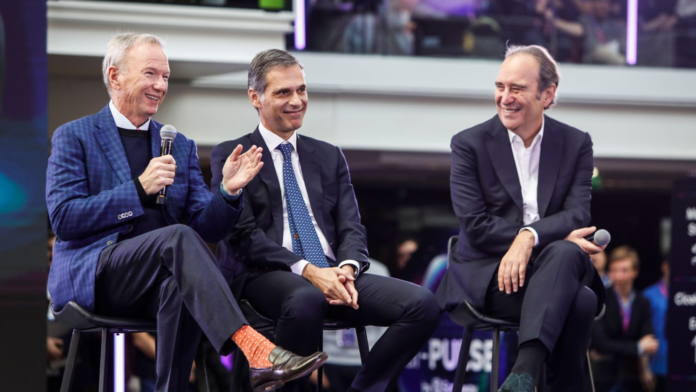In a significant move for the AI industry, Kyutai, a new French artificial general intelligence research lab, is making headlines with its ambitious vision and substantial funding. At the recent Scaleway’s ai-PULSE conference, Iliad CEO and French billionaire Xavier Niel unveiled fresh details about this Paris-based initiative, which is set to reshape the landscape of AI research.
Kyutai is not your typical research entity. This privately funded nonprofit is diving into the realm of artificial general intelligence with a staggering budget of €300 million. What makes Kyutai stand out is its commitment to open source – a move that promises to democratize AI development and foster innovation on a global scale.
The funding story behind Kyutai is as impressive as its mission. Initially, Niel committed €100 million, a figure that has now ballooned to nearly €300 million, thanks to contributions from various heavyweights. Among these is Rodolphe Saadé, CEO of CMA CGM, who has matched Niel’s investment with another €100 million. The lab has also attracted funding from Eric Schmidt’s foundation and several anonymous donors, reflecting a broad base of support for its open-source vision.
Kyutai’s approach to AI research is refreshingly collaborative. It aims to work closely with PhD students, postdocs, and researchers on a range of projects, including research papers and open-source initiatives. This collaborative ethos extends to its computing needs, with Scaleway, Iliad’s cloud division, providing crucial resources like a thousand Nvidia H100 GPUs – a vital asset for AI inference and model training.
The lab has already begun assembling a stellar scientific team, drawing talent from prestigious institutions and companies like Meta’s AI research team FAIR, Google’s DeepMind, and Inria. Patrick Perez, formerly of Valeo, is set to lead the lab, bringing a wealth of experience to the role. Additionally, a team of scientific advisors, including luminaries like Yejin Choi, Yann LeCun, and Bernhard Schölkopf, will provide periodic feedback and guidance, ensuring the lab stays on the cutting edge of AI research.
One of Kyutai’s key draws for researchers is the freedom to publish their findings – a liberty increasingly restricted in big tech firms. This open approach to research is not just about advancing individual careers; it’s seen as essential for contributing to the collective good of the AI community and beyond.
Kyutai’s open-source philosophy aligns with broader trends in the AI field. While it’s not the first open AI lab – OpenAI began with a similar nonprofit model before shifting to a more traditional corporate structure – Kyutai’s commitment to open science sets it apart. The lab plans to release not just open-source models but also the training source code and data, offering unprecedented transparency and fostering deeper understanding in the AI field.
The timeline for Kyutai’s outputs is cautiously optimistic. While speed isn’t the primary objective, the lab aims to share its initial findings and models within a year, balancing the urgency of innovation with the need for thorough scientific exploration.
Interestingly, Kyutai’s emergence could spark new dynamics in the AI landscape, especially in how private companies might leverage its open-source models for commercial applications. This possibility aligns with French President Emmanuel Macron’s vision of turning open-source AI into a French asset, as he expressed in a pre-recorded message at the conference.
Macron’s message also touched on the broader context of AI regulation. Amid discussions on Europe’s AI Act, he emphasized the need for balanced regulation that focuses on use cases rather than stifling technological innovation. This stance, which Niel echoes, highlights the delicate balance between fostering AI innovation and ensuring its safe and ethical application.
In conclusion, Kyutai is poised to be a game-changer in the AI research world. Its open-source approach, significant funding, and collaborative ethos set the stage for groundbreaking advancements in AI. As Kyutai embarks on this journey, it’s not just about pushing the boundaries of AI technology; it’s about reshaping the very landscape of AI research and innovation, with a distinct French flair.












